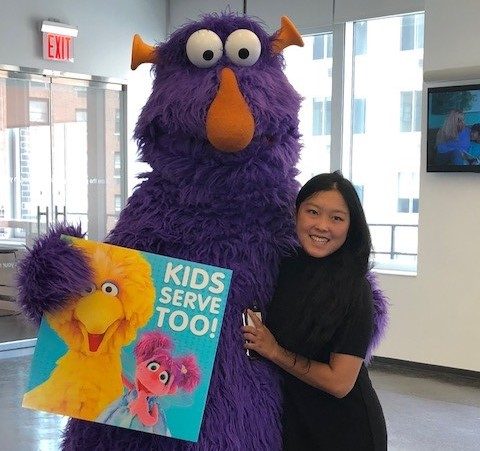
by Madison McHugh | Aug 20, 2018 | Internship Experiences, Undergraduate Students
My name is Kylie, and I am a senior Diplomacy and Modern Language major with a minor in Economics. I interned in Sesame Workshop’s Philanthropic Development Department. Sesame Workshop is the umbrella nonprofit educational organization that produces Sesame Street, which is far more than just the show. The organization works in 150 countries and has initiatives that range from dealing with grief for families of military personnel in the US to performing outreach for those affected by HIV in South Africa. I was drawn to this internship by Sesame’s creative approach to tackling difficult community issues worldwide, and I wanted to pursue my interest in education at a large organization.
My responsibilities included research, filing, inventory, team meetings, and mail management. Although the work wasn’t always glamorous, Sesame interacts with incredible people and entities, from Priscilla Chan to the Canadian government, which allowed me many opportunities to network. I also completed two major projects during my time at Sesame: the first was completing research for Sesame’s 50th anniversary next year, and the second was labeling production documents and plans from the Bangladeshi program’s ninth season production and education initiative. These projects allowed me to embrace the “insider’s view” and appreciate the kind of attention that goes into various initiatives.
Interning at Sesame showed me that nonprofits in education are an exceptional pathway to making a difference, even if it is not as flashy as counterterrorism or cybersecurity. In addition, I realized the intersection of elementary education and diplomacy as Sesame’s programs seek to simplify universal values and international issues to a level that children can internalize. Their goal is not to teach the statistics and policy, but to teach understanding and acceptance. They are instilling habits for children that lead to better lifestyles. It’s not just about learning the alphabet and numbers, but learning about the respect needed to heal divides in the ethnically and religiously diverse streets of Isreal (Rechov Sumsum) or to empower girls in Nigeria (Sesame Square). Many children in countries that Sesame Street airs in obtain their primary education through the show due to conflict, poverty, or the lack of a school system.
My time at Sesame was an amazing experience that taught me the dynamics of how large offices work and the responsibilities of various departments. As an intern, I completed informational interviews with department heads, and my last semester project included researching part of the department to make suggestions on improvements or initiatives. My project on the Yellow Feather Fund included marketing and development strategies to increase the reach of the fund, and this allowed me to explore business ideas outside of my field of interest.
Overall, I would recommend this internship or any other internship within Sesame, as the office is a welcoming environment and one dedicated not only to educating the public but enriching its interns with new experiences and ideas.
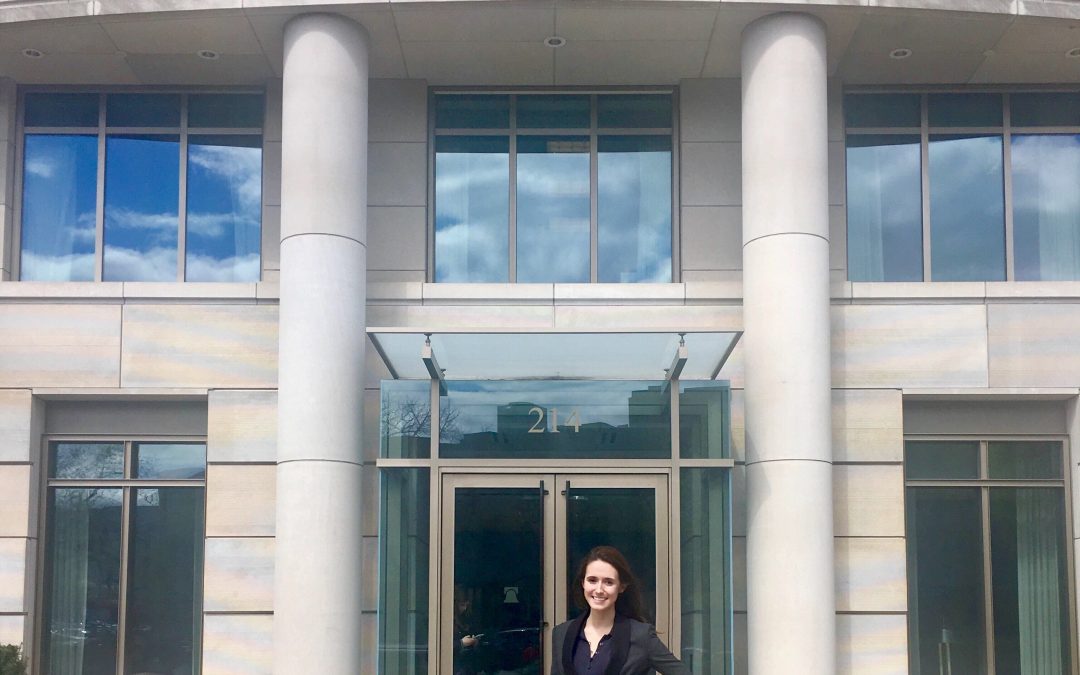
by Madison McHugh | Jun 18, 2018 | Internship Experiences, Undergraduate Students
My name is Iulia Lupse, and I am studying Diplomacy and International Relations with a minor in Russian and Eastern European studies. I interned in the Media Relations department at the Heritage Foundation in Washington, D.C. I was initially interested because it is the leading conservative think-tank in the United States. I completed extensive research before applying, and when I learned about their Young Leaders Program, I was hooked. The program offered skill development briefings, policy briefings, and first principle lunches. In the skill development briefings, we learned valuable skills to navigating Washington D.C., such as public speaking, networking, and resume building. In the policy briefings, interns were informed on numerous subjects such as defense, foreign policy, healthcare, education, and more. The First Principles Lunches were my personal favorite as we participated in discussions about the founding principles, the conservative movement, and the philosophy behind conservatism.
While my interests lie in national security and defense, the skills I learned in the Media Department are useful for a wide-range of jobs. My main responsibilities included logging print hits, writing press pitches, keeping the Heritage Press and Heritage website up-to-date, and compiling media lists. On less busy days, I attended Heritage events and others around the city, allowing me many networking opportunities. Initially, I found that my greatest challenge was public speaking and networking, because I tended to be shy in conversation – however, I overcame this fear during my time at Heritage, and it certainly paid off.
The highlight of my internship was attending C-PAC. I had the pleasure of meeting President Kay Cole James, Ivanka Trump, Paul Teller, and Ben Shapiro among many others. I also completed projects with my mentor in the defense department at the Heritage Foundation, including research on the new defense bill and the importance of nuclear deterrence. These experiences were crucial during my time with the Heritage Foundation.
Although I plan to continue my pursuit in intelligence careers, the connections I made and the skills I gained will be valuable in any field I will choose in the future. The Heritage Foundation gave me the opportunity to apply and expand my knowledge and skills. I would highly recommend this internship to others because it provides a wonderful learning experience and networking opportunities. I am ever grateful for what I learned, and I am even more excited to continue learning based on my experiences in D.C.
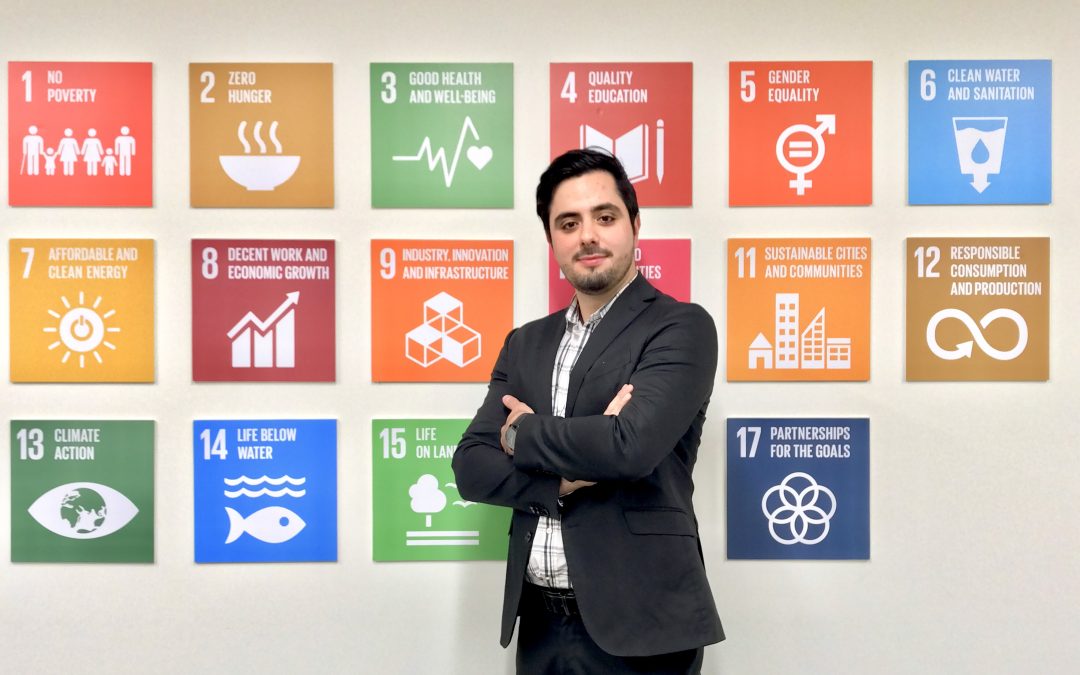
by Madison McHugh | May 18, 2018 | Internship Experiences, Undergraduate Students
My name is Ahmet Yoruklu, and I am a senior studying Diplomacy and International Relations with a double major in Economics and a minor in Russian. I am currently interning at the world’s largest corporate sustainability initiative, the United Nations Global Compact, whose mission is to mobilize a global movement of sustainable companies and stakeholders to create the world we want. Since I have been interested in multi-stakeholder collaboration between the private and non-business sector for development and sustainability across the world, I can’t think of a better fit for my personal development in this space.
As I work on the Client Engagement team here at the UN Global Compact, I get to interact with our business participants on various topics; from communication on annual progress reports to post-event follow-up campaigns. In addition, I conduct rigorous research on prospective participants and assist my supervisor in executing recruitment procedures efficiently.
What I enjoy the most about my internship is that I have the privilege of learning about the world’s largest companies and MNC’s as part of my work. It is an outstanding experience to witness how businesses align their operations and business strategies with global goals for a more sustainable world. Moreover, the opportunity to attend flagship events on different themes, such as the Commission on the Status of Women as well as the SDG Business Forum during my internship period at the UN Headquarters is certainly an invaluable experience.
When it comes to my studies at Seton Hall, what I do here on the Client Engagement team is very much related to Diplomacy and International Relations as well as Economics. Since we are a multi-stakeholder organization, we communicate with numerous entities from all over the world which requires a certain knowledge of diplomatic language and cultural awareness. In terms of diplomacy, I am certainly reaping the rewards of what I have learned studying diplomacy as I execute on my tasks, whether writing a report or utilizing critical and rational approaches during decision-making processes. Combining my knowledge of diplomacy with economics has created the best foundation for me to understand why for-profit entities take certain actions in the global economy and how I can come up with innovative ideas and solutions to achieve our agenda at the UN Global Compact. Both diplomacy and economics prepared me to be more resourceful when it comes to communicating with private sector companies and engaging them with our organization.
As I gain new experiences with this internship, it has helped me become more realistic about my career goals in terms of what path to follow in the near future. Through the experiences I add to my skillset, such as CRM management, strategic partnerships, and corporate communications, I am becoming more prepared than ever to pursue my goals in the sustainability space.
I would definitely recommend this internship opportunity to anyone who would like to gain hands-on experience in private and non-profit sector collaboration. The UN Global Compact provides an outstanding environment for those who are passionate about fulfilling global goals via local business in every part of the world – from the center of the world, New York City.
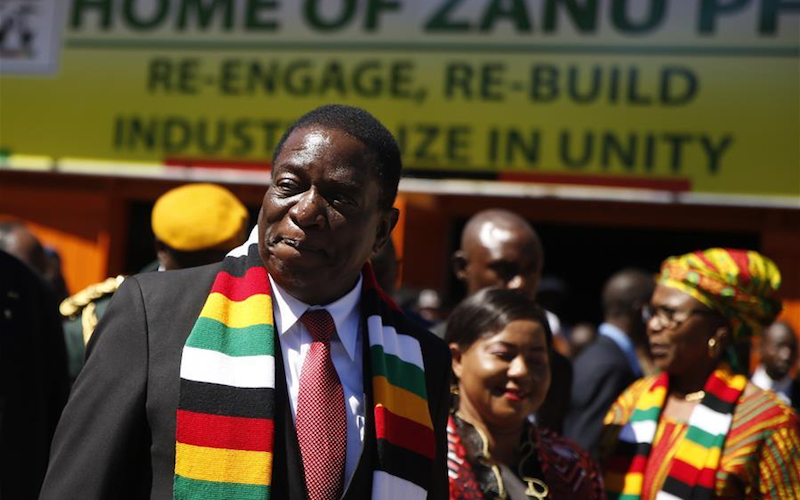
by Madison McHugh | May 9, 2018 | Graduate Students
M.A. first-year Diplomacy student Erick Agbleke originally published an op-ed piece on “China’s Neocolonialism in Africa” in the Journal of Diplomacy. The piece was then chosen for publication in the International Policy Digest.
Below is a re-print of the article, also located at the link above.
Behind the Goodwill Aid: China’s Neo-Colonialism in Africa
Erick Agbleke
December 2018 will mark the 3rd anniversary of the 6th Ministerial Conference of the Johannesburg Summit of the Forum on China-Africa Cooperation (FOCAC), where China’s Xi Jinping pledged to strengthen an already steady relationship with the African continent. With a promising speech to the African Union leadership and Heads of State, Xi promised to deliver a $60 billion package over the next 3 years that will include aid, interest-free loans, and capital.
To the 53 African countries that were in attendance, this was a welcome gift as Africa was just coming out of the ebola outbreak which left devastating effects in its path. It seems that China has found a way to expand its sphere of influence in the globalization race of the 21st century. Moreover, it is on the way to surpass the United States in terms of relevance and impact within the area. So, how and why does this matter, given the United States’ interest in the African region?
It is no secret that foreign aid can be used as a bargaining chip, where it goes a long way in facilitating international relations. For instance, the Marshall Plan of post-World War II was not initiated just out of the good heart of the US government. It was rather erected as a roadblock to the spread of communism in Western Europe. In the same way, China’s willingness to pour money and resources into the continent of Africa is not motivated by some form of sincerity towards the people, but rather to further its own agenda.
This financial sponsorship has ironically gained popularity with African leaders who welcome with open arms the gifts that Zhongnanhai come bearing to them. This allows China to bring businesses to the continent and build much-needed infrastructure, such as railroad tracks for transportation and commerce while instituting their ‘one belt one road’ initiative. However, this form of investment turns out not to be mutually beneficial to the African people. It buries the continent in insurmountable debt that the Chinese government maintains as leverage, a boon for them in terms of strategy. Case in point, the establishment of the first Chinese Naval base in Djibouti, which enables them to gain quick access into the Indian and Atlantic Ocean.
The West has a history of turning a blind eye towards Africa and its citizens, and Africans have come to accept such western indifference. Despite many clearly botched and stolen elections, including evidence of human right violations and overt dismissal of the rule of law, western powers have refused to hold many leaders accountable for their actions, no matter how vile they may be.
The silence from these countries who are typically quick to speak up and take actions when their interests are being threatened has emboldened some of these African leaders and empowered them to continue governing as they see fit. In the end, the collateral damage becomes the people they have sworn to lead and protect. China striving to be the biggest supporter and financier on the continent should be something that we should be concerned about; given the fact that they themselves are a substantial perpetrator of human rights violation and governmental intimidation. China’s waxing power on the continent may lead to an even greater disregard of human rights violations.
For the United States to regain a strong foothold within Africa and further advance its agenda of peace, power, prosperity, and principle, it must be willing to be the biggest stakeholder in terms of aid and financial support of the continent by investing in its growth and development. However, monetary support is not the only path to winning hearts and minds. Up until the Trump administration was handed control of the government, the U.S. was the best destination for education and business ventures. To some, the American Dream was still alive and attainable if they worked hard and played by the rules. This is no longer the case as the current administration sees fit to walk a hard line against immigration.
Programs such as the Temporary Protected Status (TPS) or the Deferred Enforced Departure (DED), which gave a way for multitudes of individuals that fled the atrocities in their civil war-torn countries to find refuge in America are being terminated. Families that have spent most of the past two or three decades building a new life here are being urged by a deadline to return to a country that is no longer theirs.
These more dismissive and closed policies can lead to a drop in foreign influence for a country such as the U.S., whose popularity has been on the decline over the last ten years due to the conflicts in the Middle East and elsewhere in the world. The policies being pushed by the Trump administration could, in turn, make it hard for the U.S. to gain support on the African continent while trying to curb the rise and effectiveness of terrorist groups that are operating in the area and threatening its interests.
The U.S. which has always championed itself as the vanguard for human rights around the world owes it to itself and for the success of its foreign policy to stand up to China’s expansion strategy. It will help tremendously in deterring terrorism and radicalization in Africa. However, the work should not solely rest on the Americans’ shoulders. The leadership in African countries must first recognize the neo-colonial practices that China is indirectly imposing on them and then stand against such unfair practice. To break free from dependency on outside actors and grow, there must be a willingness among the consortium to take responsibility for the development of the African continent which should be done in-house.
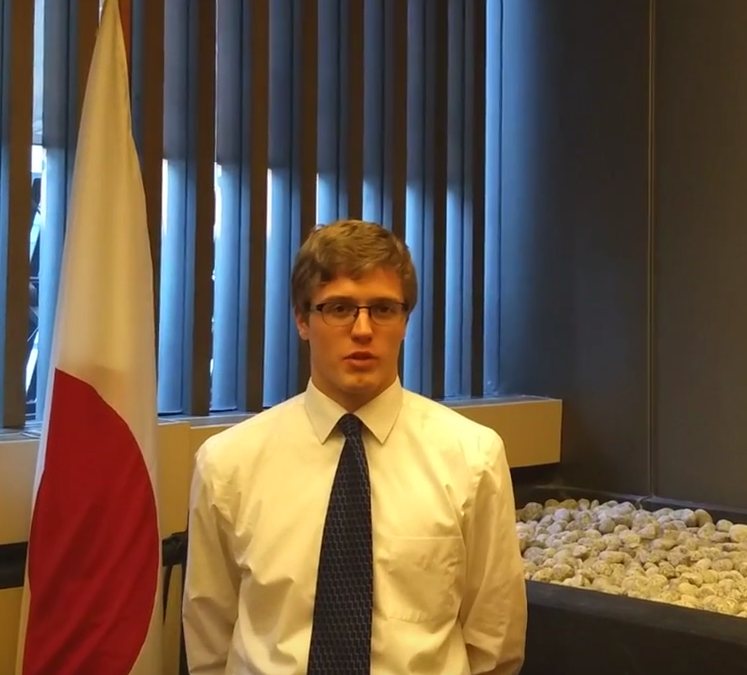
by Madison McHugh | May 3, 2018 | Internship Experiences, Undergraduate Students
My name is Trevor West, and I am a junior at Seton Hall University majoring in International Relations & Diplomacy, Modern Languages (Japanese/Chinese), and Philosophy. I am currently interning at the Japan Society Language Center in New York City, a non-profit organization founded after World War II.
I have a long-standing interest in the Japanese language and culture, reaching back to my childhood and early exposure to Japanese pop culture through anime, video games, and music. I pursued these interests further and began studying the language in hopes of being able to understand and experience more aspects of the culture. The Japan Society is a great organization that helps individuals to learn Japanese as well as appreciate the vast richness of both ancient and contemporary Japanese history, art, and more.
The essential tasks I complete at the Language Center include a variety of administrative work, such as: communicating with clients, registering students for classes, and managing the student information database by adding and updating information. I also interact with staff and see the living process of a school-system. My internship relates to my international relations curriculum as I am experiencing how a non-profit operates and meets its goals.
This internship has been a first-hand look into a system that, until now, my classes have only focused on in the abstract aspects. The mission statement of the Japan Society, with its goal to deepen “mutual understanding between the United States and Japan in a global context” appears abstract until put into practice. The Language Center’s practice fulfills this deepening of mutual understanding by facilitating classroom experiences, and my responsibility is to ensure that interested individuals receive excellent service. These individuals will learn from the courses and further their understanding of the Japanese language and culture, and the Japan Society will be one step closer to their goal of expanding U.S.-Japan relations.
My internship with Japan Society has been a humbling experience and shown me how amazing NGOs are in practice. It is one thing to learn about organizations, institutions, governments, or any other complex topic in the classroom, but actually working and getting to know the feeling of how an organization functions is different. The internship has given me practical knowledge that the classroom has not precisely because physical experience helps one to grasp the abstract concepts learned in the day-to-day functioning of an organization.
This internship is exciting because it is an opportunity to see the real-life application of what I have learned so far in my classes. While the skills I use daily are relatively basic, interning at the Language Center has given me a way to connect with others who are influential in promoting deeper U.S.-Japan relations and allowed me to give back and participate in the mission. Thus, the best part of this internship is the happy union between what I have learned in class and the tangible functioning of Japan Society as well as the opportunity to further U.S.-Japan relations.
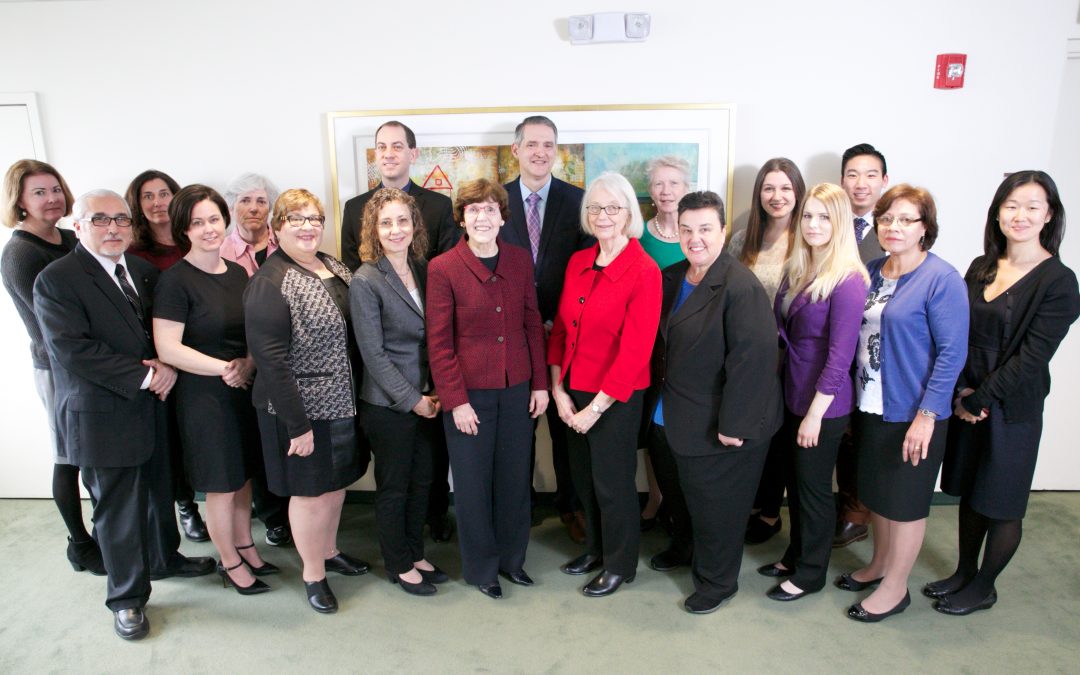
by Madison McHugh | Apr 19, 2018 | Graduate Students, Internship Experiences
My name is Madison McHugh, and I am a graduate student in the dual degree program at Seton Hall University. I am obtaining a Master of Business Administration as well as a Master of Arts in Diplomacy & International Relations. I interned as the Communications Associate at The Nicholson Foundation, a non-profit organization in Newark, NJ focused on funding projects in health and early childhood across the state.
As a Communications Associate, I worked directly under the Communications Manager and assisted in assignments related to the official branding of all materials for The Nicholson Foundation. These assignments included managing website content, posting for the organization’s official social media, and writing and editing press releases, op-eds, and speeches.
My coursework in the dual MBA/MADIR program prepared me for success in my internship as I utilized skills such as research, writing, and public speaking. Not only do I feel that I honed my writing into specialized capacities, such as those embodied in health and early childhood education, but I am confident that I can fulfill the responsibilities of a communications position in my post-grad prospects.
My internship with The Nicholson Foundation was a unique experience because it offered me vast flexibility in assignments and responsibilities. Moreover, my individual input was highly valued within the organization, and many of my ideas were implemented during my time. I was even able to pitch a unique idea to the Executive Director: I wanted to create and manage his official, professional Twitter page. To this end, I created a PowerPoint and pitched the idea after setting a personal meeting. He was very receptive, and with more discussion on details and management in the weeks to follow, he agreed that I should move forward with my idea.
The freedom that I was given at The Nicholson Foundation was both exhilarating and intimidating. On the one hand, I was able to capitalize many times on my ideas and implement positive changes towards increased efficiency and impact within and without the organization. On the other hand, the Communications Manager offered me a great amount of responsibility during his paternal leave, and I managed the Communications Department in his stead throughout April and May. At the time, while I had been acclimated to the chain of command, it was a new and exciting challenge to manage to both positions as well as the needs of the department as they overlapped with others in the organization.
I would highly recommend this internship to students who want the opportunity to put their innovation, originality, and professional drive to the test. The Nicholson Foundation is a wonderful organization that embraces new ideas and values contributions from youth that perpetuate the organization’s legacy as a health and early childhood funder in New Jersey.
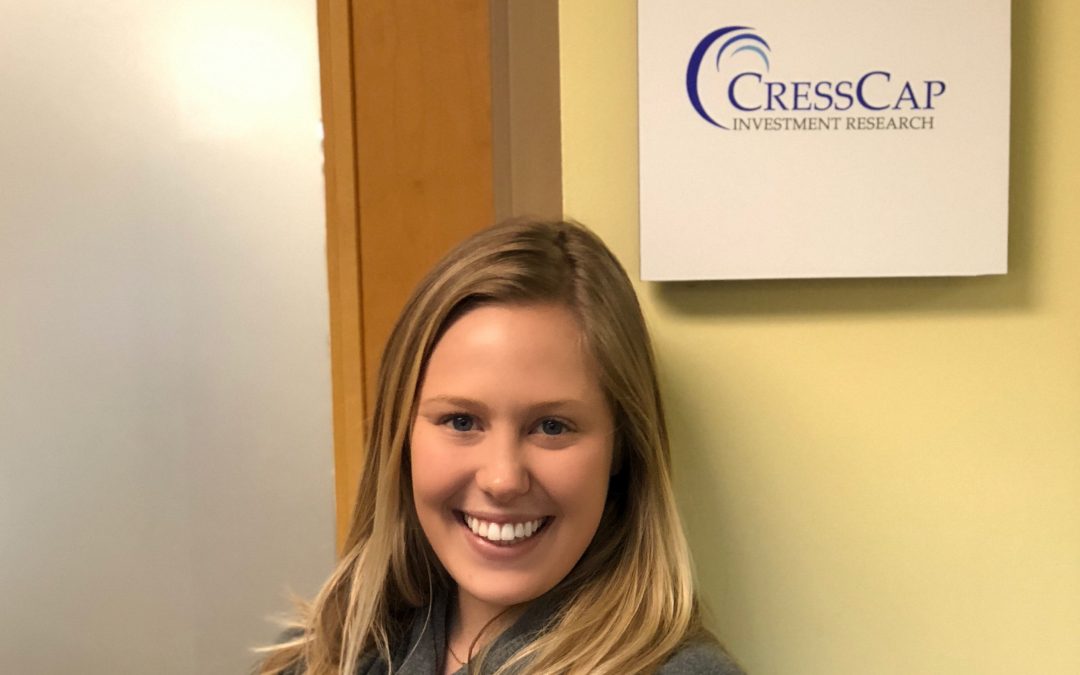
by Madison McHugh | Apr 5, 2018 | Internship Experiences, Undergraduate Students
My name is Tela Wittig, and I am a junior Diplomacy and International Relations student. I have taken a convoluted path to my current internship and career field, changing my focus from international criminal law and law enforcement to international business. It was through this journey that I came to intern at CressCap Investment Research.
CressCap is a small, innovative company that has essentially automated many of the functions of a financial analyst through fractal analyses of stocks’ fundamentals. Although investment research is considered far removed from the international relations education I received, my assignments have been shockingly compatible with my skillset. I recall coming into the office for my second interview as well as my first opportunity to meet with the whole team. They asked me several questions about how I had found out about the internship and why I had decided to follow through with the application. Through these questions, it was clear that they were beating around the point that I had no finance, sales, or programming experience – the skills most natural to FinTech startups.
My final interview was with the COO who asked me outright why I wanted to work at CressCap and what I wanted out of this experience. I answered without hesitation that I had made a commitment to moving into the private sector and I intended to learn. Then we went through the CressCap website, and I explained the grammar and style changes I thought would improve their external image. I suppose it’s just lucky that I walked into a group of people who are invested enough in their business that they appreciate that kind of criticism from an interviewee, but the chance I took paid off. Since then, I have found the office to be a great place for expressing myself and feeling heard.
Today, I am three months into my first experience in finance. My passion for the finance industry has grown, and my new knowledge has helped me identify and express what I want to do in my professional career. I am working hard to learn all that I can about running a business, including sitting in on meetings, asking questions, and working within our systems. Moreover, while learning new skills, I have also come to realize that there are many aspects of my international relations education that I can maintain as I move farther into my finance career.
In the finance sector, it turns out that reading, writing, and language skills are key. This has worked to my advantage in many ways. My education in Diplomacy and International Relations helped me improve my writing and analytical skills. In addition, I worked as an English writing and grammar tutor on the Seton Hall campus. These experiences helped me realize my love for the English language and further advance and improve my Chinese language education. I know now that I can pursue each of these subjects in conjunction with finance and make myself indispensable by possessing coveted language skills and expertise. As a result, I was chosen to work with CressCap’s CEO to write weekly contributor articles for Forbes.com with top and bottom international stock picks using our platform’s analysis. In this way, CressCap has been an exceptional experience because it has allowed me to tailor my unique skillset to the tasks at hand. This has brought all of my passions together to create something I really love to do, which is an exceptional opportunity at 20 years old. I highly recommend the internship for students who want to learn about finance from the ground-up and increase their marketability in the private sector.
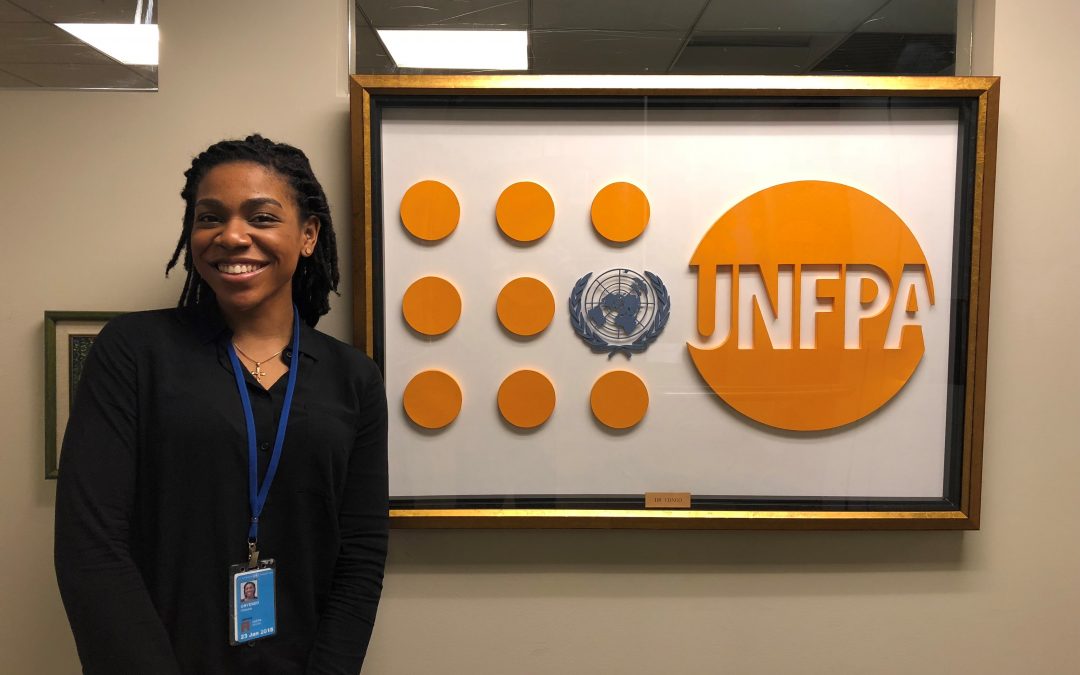
by Madison McHugh | Feb 7, 2018 | Graduate Students, Internship Experiences
My name is Chiazam Onyenso, and in my final semester within the Master of Arts program in International Relations and Diplomacy, multiple experiences have driven my current desire to continue my academic pursuits as they pertain to international affairs. My interest in collaborative international agencies reflects the internship I’ve committed myself to at the United Nations Population Fund.
My first-year M.A. studies mainly observed the nature of conflict, theories on the correspondence of the international community, resolutions and the management of international institutions that all catalyzed my eagerness to work for the United Nations. As a humanitarian information management intern for its Humanitarian and Fragile Contexts Branch (HFCB), working with the United Nations Population Fund (UNFPA) provided me with relevant knowledge on the effects of crises and the various avenues utilized by UN agencies to provide relief to affected populations and to address critical international issues. I developed exceptional skills in internal correspondence, analyzing and visualizing data, and reporting on fast-paced crisis situations in real-time. My assignments required background knowledge on humanitarian crises along with nurturing a strong understanding of UNFPA’s gender-based violence and health services for youth and women in conflict.
My experience as a UNFPA intern made me increasingly interested in staying with agency, in order to continue learning more on how it functions to fulfill its mandate and begin my career. Since last July, I have assisted HFCB in creating fact sheets, developing situation reports and analyzing information that will gradually populate UNFPA’s newly launched data portal, and the upcoming Humanitarian Action Overview for 2018. At the UNFPA, my work has been greatly complemented by the skills and knowledge I’ve procured through my master studies. Specializing in International Organizations, Global Negotiation and Conflict Management, while also earning a certificate in Post-Conflict Reconstruction and Sustainability has contributed to my understanding of UNFPA’s role and overall humanitarian response. Most of all, I’ve recognized the most crucial capacities of international assistance and aid rely on sound international law.
I hope to broaden my experience in international relations in line with international law. Adequate response to affected populations and vulnerable groups across the globe depends on human rights policy and effective rule of law; essentials that have been made incredibly clear to me at UNFPA.
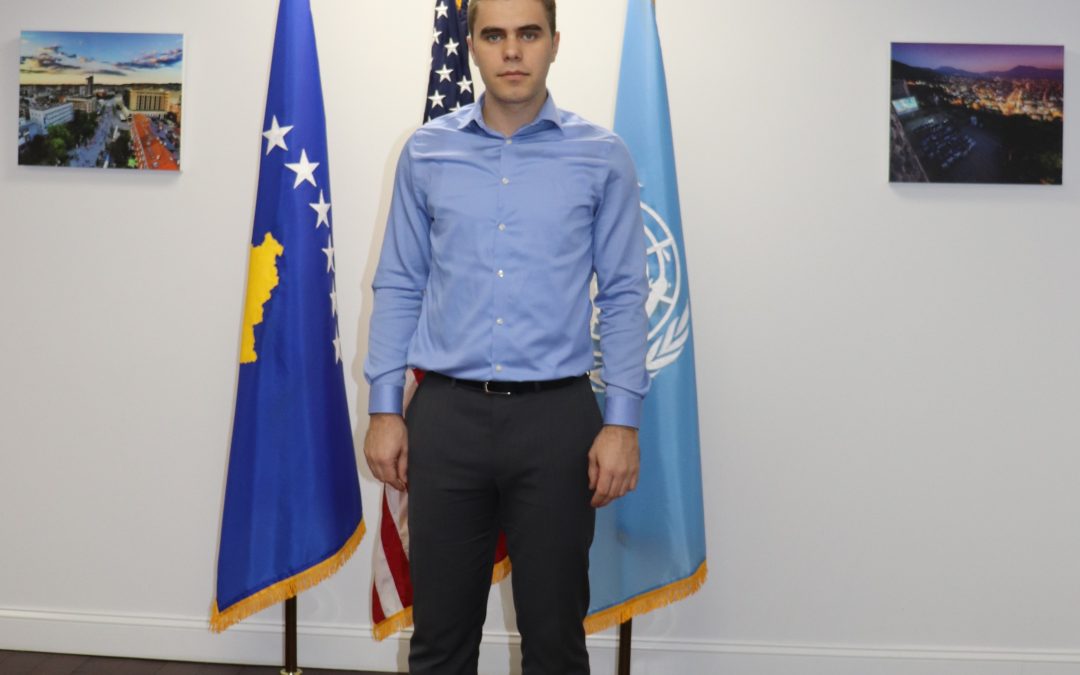
by Madison McHugh | Jan 24, 2018 | Graduate Students, Internship Experiences
My name is Lis Kabashi, and I am studying International Relations and Diplomacy at Seton Hall University. I come from a city called Mitrovica, which is located in the northern part of Kosovo.
I interned at the Consulate General of the Republic of Kosovo. In contrast to other Consulates, the Consulate General of Kosovo serves a dual purpose. Apart from serving its citizens in the US, the Consulate General also serves as a lobbying ‘mission’ to the UN, seeking more recognition for the Republic of Kosovo.
I decided to intern at the Consulate General of the Republic of Kosovo because in the future I would love to work as a diplomat for my country in one of our Embassies around the world. As the number of countries that recognizes Kosovo has gone up to 114, new Embassies and Consulates are opening up around the world. Thus, demand for experts in international relations and diplomacy has increased. For me, the experience at the Consulate General is a very important first step towards that goal.
My intern duties at the Consulate varied. For example, I prepared news analyses and reports on current events related to the Republic of Kosovo. Such analyses and reports served the purpose of informing the Ministry of Foreign Affairs in Kosovo.
During the UN General Assembly 2017, the Consulate received two High-Level Delegations: Presidential and the Ministry of Foreign Affairs. Along with another intern, I led the efforts in putting together files for each meeting that took place. These files, intended for the Chief of Cabinet for each delegation, consisted of brief biographies and resumes of each High-Level leader. Since most of our classes at the School of Diplomacy require us to learn about foreign policy decision makers from countries all over the world, I think that this is one of many ways how my internship related to my classes at the School of Diplomacy.
The opportunity to work at the Consulate was not only a period in which I learned about diplomacy – it was instrumental in building my professional network. Over two months, I had the honor of meeting Ambassadors and diplomats from various countries and attending functions hosted by different missions at the UN. Almost all of the diplomats that I met shared some of their experience and knowledge with me. Thus, I have learned how to think as a diplomat as well as how leaders protect the interests of their countries.
I recommend the internship to those who are interested in having a career in diplomacy. Apart from meeting key decision makers from all over the world, an intern at a Consulate could also improve their written and verbal communication skills, which are key to becoming a successful diplomat.
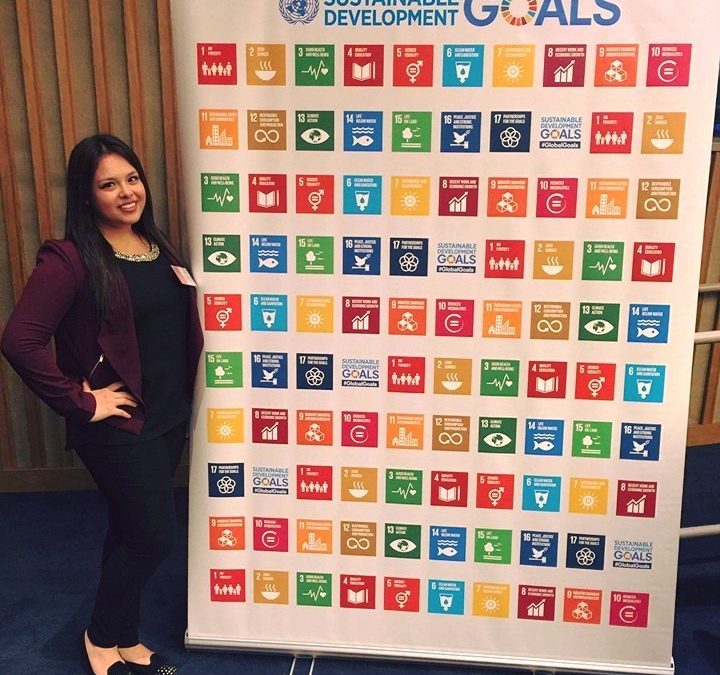
by Madison McHugh | Jan 10, 2018 | Internship Experiences, Undergraduate Students
My name is Laura Muñoz, and I am currently an undergraduate student at the School of Diplomacy and International Relations at Seton Hall University. As part of my final semester of my undergraduate career, I completed a full-time internship at the 20th District Legislative Office in Union, New Jersey alongside the Director of Constituents as well as Assemblywoman Annette Quijano.
As an intern, I experienced magnificent opportunities, met amazing public officials, and learned about the in-depth processes of local politics. My main responsibilities as an intern at the legislative office was assisting Union County constituents who visited the office regarding claims, renewals, and referrals. In addition, I was often placed at the Elizabeth office to complete hands-on work.
During my time with the 20th District, the office partnered up with other legislative teams to provide supplies to Puerto Rico, and I assisted in facilitating donation teams. We completed many more local and state-wide events and community fundraisers. I also completed work in the field with campaign-related volunteering outside the office for Assemblywoman Quijano, particularly during the gubernatorial debate between the two governor candidates for the New Jersey election, Phil Murphy and Kim Guadagno. In addition, I was invited by the Chief of Staff for Senator Lesniak to see Barack Obama’s endorsement speech for Phil Murphy – an incredible event!
My internship with the 20th District has helped me a lot with practicing diplomacy in the real world. This internship has helped me put my skills into action. Networking is a big part of what our professors highly encourage, and I have done a lot of networking with my internship. This internship has made me realize how much more I want to work in the international field. Yes, I have learned a lot of local politics and how important it is; however, I do like more of relations between countries and how that affects the entire world. My internship at the office has also reminded me of the importance of remaining educated. Having conversations with people has been very rewarding because I use the knowledge and skills that I have learned in class, and it is amazing to have a conversation with someone about world politics and give my informed opinion.
I would recommend this internship to anyone in the Diplomacy school because I believe that the 20th Legislative office is one of the most diverse offices that New Jersey has. This internship thus far has helped me learn, grow, and realize how important it is to practice diplomacy and do what you love.










